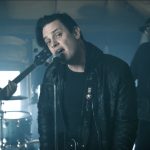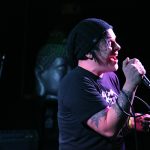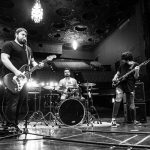SONG PREMIERE: In NEPA music scene, gothic dark wave/neofolk solo project Zeu sticks out with ‘Black Tongue’
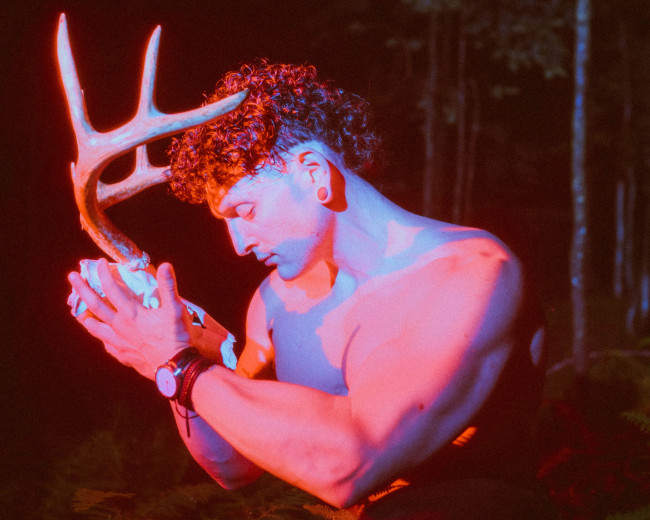
Coming across the music of Zeu is like discovering a mysterious band from the 1980s who left behind an experimental catalog of cryptic songs that are easy to get lost in as the layers of dark imagery envelop the listener in a darkening cave echoing with deep, enigmatic emotions that are as identifiable as they are mystifying.
Any attempts to search for more about this obscure artist fall short, though, leaving them wanting more. Thankfully, this isn’t some long-abandoned project from decades past and Matthew Zedolik is prepared to give it to them, no longer content with being a best-kept secret in the diverse and ever-expanding music scene of Northeastern Pennsylvania.
For the past nine years, the Mountain Top native has been releasing singles, EPs, and full-length albums – six, and counting – under a simple moniker that “just sounded cool,” reminding him of “krautrock” bands like Neu and Can. He has described himself as “the Elvis of dark wave” and his neofolk sound as “if David Lynch produced ‘Born in the U.S.A.,'” an intriguing scenario of existential dread that plays out on gothic axes and synths on “Death Masks” and an acoustic guitar paired with a harmonica on “Remains,” apocalyptic albums appropriately self-released at the beginning and end of 2020, respectively, and both haunting in their own way.
“Black Tongue,” a standout from his subsequent singles, premieres today exclusively on NEPA Scene as it consumes major streaming platforms like Spotify.
“While trying not to sound like a self-help ad, the pandemic was the best thing that happened to me. I was just being a goon, staying out all night partying, doing reckless shit and hanging out with people I shouldn’t of been hanging out with. Bad habits, people, and influences were really taking a pilot seat,” Zedolik admitted in his first interview about Zeu.
“It kind of reset my life, made me take better care of myself, distance myself from not-so-great influences and people, and really prioritize my close friends and family. ‘Black Tongue’ and most of the new material is my interpretation of a whimsical, bizarre, trauma-filled world, in what seemed a lifetime ago.”
Going it alone
As a musician, the 33-year-old Avoca resident has lived several lifetimes, first picking up a guitar at age 14 after hearing Metallica and Black Sabbath for the first time. In high school, he played in “various no-name metalcore bands,” then later took up the bass for Pennsylvania indie rockers The Ordinals and lead guitar in Scranton-based Americana/folk group American Buffalo Ghost from 2018 through 2020. In all that time, he never stopped working on writing and recording his own personal material that combined these experiences yet sounded little like any of them.
“I always had a passion for songwriting and audio recording/production. Writing songs is just what I do – I’ll be writing until the day I die, probably. The style of music Zeu was writing and inspired by was heavily influenced by the recording and production process, so the two went hand in hand,” he noted.
“I was always insecure of my voice and lyrics, but it seems to be what people enjoy most about me as an artist and performer. I sort of really embraced having a uniquely imperfect, yet recognizable voice. It’s definitely in the Lou Reed, Bowie, Iggy Pop category of personality singers.”
For those unfamiliar, he delved deeper into “dark wave” and “neofolk” terminology and what these genres mean to him.
“Dark wave is just a broodier, darker version of post-punk. I was always drawn to bands like The Smiths and The Cure because of the melancholiac, moody songwriting. Around 2011, my friend showed me the band Cold Cave, which was a dark wave project of Wes Eisold from the hardcore band American Nightmare. It was a darker, more synth-y version of the ’80s new wave and post-punk I already loved. That was the gateway to more modern bands in that genre such as Drab Majesty,” he began.
“On the other end, I discovered the country songwriter Townes Van Zandt. Songwriting and lyrically, he was the biggest influence on me. Neofolk blends folk and traditional folk songwriting with darker, more apocalyptic themes and sometimes a punk, industrial edge, so if you combine Townes Van Zandt with Sisters of Mercy, you’d get neofolk.
“Even though I was influenced by more aggressive bands like Metallica, or Black Sabbath, the dark wave-influenced folk songs were more along the lines of what I was listening to and influenced by. It was also easier to write in that genre being that Zeu has been largely a solo project.”
It is truly a solo effort, as he not only records every instrument himself, he also produces songs that reflect his tastes alone, standing out from everything else coming out of NEPA at the moment.
“I’m in my own bubble as far as what music, movies, and art I like. I listen to older stuff than most people my age do, so if you combine that with the more modern dark wave/goth stuff, you can kind of catch my sources. I try to keep up on current trends and new bands. In the end, you just have to adopt stuff you like, be you, and make it your own. I just love ethereal, darker music with good songs and melodies,” Zedolik enthused.
“I moved to New York City in 2011 to go to a trade school for audio recording, and experiencing a completely different place with a ton of viewpoints and cultures had an influence on me. This kid I went to school with was in an awesome shoegaze band; they really exposed me to a lot of more alternative/indie music. The musicianship and songwriting there was also on a different level; I felt like I had to catch up. I also worked at a recording studio there, which exposed me to the classic stuff I love now and some of the current newer bands.”
This all became part of the independent, self-reliant process behind his music.
“Zeu was started as a vehicle for my songwriting. The recording has been a huge part of the sound. That’s actually why I started the project in the first place. NEPA tends to be a very hard rock/metal/hardcore-oriented town. I got laid off from my recording studio job in New York City and was writing these ambient shoegaze-type songs. Audio production and getting the right sounds are such important parts of the music Zeu was influenced by, and none of the studios or engineers around here seemed to be able to do it, so I just started recording myself,” he explained.
“Most of my music tends to sound like old country songs on acoustic until I add all of the production to them. I feel that is what makes it unique as well. A lot of the songs are written by me just jamming on guitar, synth or a drum machine. They often are written and recorded very fast, and not overthought – there is nothing worse than overthought songwriting.
“Everything is recorded at home with a few mics, acoustic and electric guitars, an audio interface, Pro Tools, and a virtual software suite called Reason for the synths and drum machines. Having worked in an ‘old school’ analog studio, I love studios and recording with analog gear. However, in 2023, the digital recording and software is way cheaper, easier, and sounds just as good, if not better, than its analog counterparts, especially for DIY musicians.”

Donning ‘Death Masks’
When it comes to subject matter, he is often inspired by “fucked up people doing fucked up shit.”
“My [songs are my] interpretations/perceptions of life, people, and the world around me. A lot of the songs are purposely vague, up to interpretation, and simple on the surface. I like to let the listener decide. Most great songs by any artist were written about love, lust, or the lack thereof,” he postulated.
“I’m really influenced by blues in the vain of Elmore James and John Lee Hooker, as well as early rock ‘n’ roll/rockabilly. Any ’60-’70s garage band. Radiohead, The Smiths, The Cure, The Sisters of Mercy, Cold Cave, Drab Majesty, My Bloody Valentine, The Smashing Pumpkins, Nirvana, The Stooges, The Velvet Underground, Danzig, Type O Negative, Metallica, Black Sabbath, The Misfits, Bruce Springsteen, Townes Van Zandt, Bob Dylan, Neil Young, Johnny Cash, Elmore James, Orville Peck.”
While Zeu is nearing a decade old, it has only been a live project for about half that time, albeit sporadically.
“Zeu played live for the first time in 2018 at a benefit when my friend’s dad passed away. This is when [my fourth album] ‘IV: The End of Everything’ was released; I was solo with an electric guitar and harmonica. The live performance reactions have been great. I feel my material is left field for the area, so positive reactions are always good. Some artists hate when they get compared to well-known existing artists. I’m always curious to see how people interpret it,” he said.
“Until 2018, I was just content with Zeu being a recording project. It seemed to play that style music, you had to live in a more urban area. I was content with NEPA and didn’t feel like moving. When I was playing live with American Buffalo Ghost, it rekindled my love for playing live music.
“I was going to see a lot of dark wave and industrial bands in Philly before COVID. Most of them were just two people, a drum machine, and synths. I was inspired and thought, ‘I could pull my music off live in this way.’ I put ‘Death Masks’ out in March of 2020 and was planning on going full force and playing out as much as possible – then COVID happened and the world shut down for two years.”
Away from the public eye, Zedolik has been able to develop his creative impulses into the polished work it is today.
“The early Zeu material was heavily influenced by shoegaze, Brian Eno, krautrock and ’70s ambient music. David Bowie’s ‘Berlin Trilogy’ and Radiohead’s ‘Kid A’ were very influential on those early albums. The first album had no vocals! Those albums have some really experimental weird songs that express my love for using the recording studio as an instrument. I really wanted to be able to do what Bowie did on ‘Low’ or Radiohead did on ‘Kid A’ as far as creating these nontraditional songs using studio tricks and effects,” he described.
“‘IV’ is an off-center album because it’s mostly acoustic and stripped down. At the time, I was just into more pure, raw folk music. In the discography, it makes sense because it’s really a pivotal point where Zeu goes from experimental indie rock to adding in the sharp, neofolk aspects and powerful songwriting.
“When ‘Death Masks’ was released, it was the first album that sounded the way I wanted a record to sound, from the lyrics, vocals, songwriting, production. It was like if David Lynch produced [Bruce Springsteen’s] ‘Born in the U.S.A.” I love the earlier albums, but I truly found my form as an artist, so to speak, on that release. No one was really doing the ’80s songwriter thing, so I just leaned into it. My voice just developed along with my songwriting, and it was just the next version. It was just more me writing more traditional-type songs rather than writing experimental krautrock jams. Everything in Zeu has just been natural and evolved with me as an artist.”
This has also given him the chance to develop a dark aesthetic through album artwork, promotional photos, music videos using footage from old silent films, and more, letting others into what he has largely done on his own up until now.
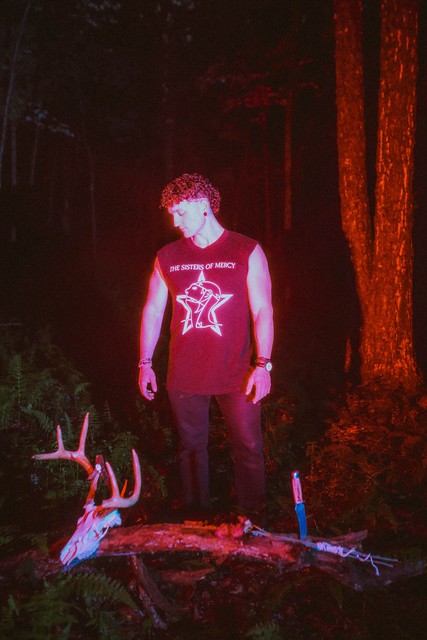
Converging creativity
“I always loved art, photography and film, so creating album artwork or videos is just as important to a band or artist as the music. I did collaborate – Rob [Holodick] from VULTUREPEAK made the artwork for ‘Death Masks,’ and my friend did the cover for ‘Gloss Flowers.’ ‘Wild Shores’ artwork is credited to Kuba Gryglicki,” he listed.
“The most of the current photos and imagery you see are all credited to my younger brother Chris and his girlfriend Lexie Padavan of Monochrome Creative and Tintaghost. She is one of the most unique and talented local photographers/artists. They are really into A24 horror movies and the current post-punk music scene; they really have an eye for the vibe of this music/art. I’m a huge fan of Lexie’s work and portfolio. They believe in what Zeu is doing and wanted to help me realize the visual aspect the fullest. It really helps to collaborate with people who understand your direction, vision, and aesthetics.”
He is content to remain a solo act for the time being, but the thought of collaborating further with bandmates has crossed his mind.
“I would love to eventually find people to play live and record with and evolve Zeu into a full band. If I meet musicians who want to collaborate with what I’m doing, that would be awesome. Playing in a band is hard, more so making sure everyone gets along and is on the same page vision-wise,” he spoke from experience.
“Zeu has been able to be so prolific because it has just been me so far; I know exactly what I want each album and just make it happen. Hopefully it can morph into an awesome band or have collaborators for future releases.”
His next full-length album, currently untitled, will include the singles “Black Tongue,” “Out of Time,” “Vampire,” and “Touch of Evil,” all available for streaming now.
“I love albums. I hate the current ‘release the whole album or EP as singles’ trend, but it seems to make the most sense for smaller artists at the moment,” he said.
“Having released six albums myself out of passion without any plan or goal in mind, it might be smart to wait to release a new one until I have more of a local audience.”
Zedolik hopes to do that by playing out more and finding other musicians to work with on new and existing material, live or in the studio. The NEPA Scene Open Mic, held every Tuesday at The V-Spot (906 Providence Rd., Scranton), has helped with that as he became a regular performer at the event over the last year.
“After COVID, it seemed like the best place to perform. I’ve followed NEPA Scene throughout the years and appreciated how the publication covers everything in all of Northeastern Pennsylvania. People rag on NEPA for having nothing to do, and the locals being negative. Some of that is true, but change starts in a grassroots way from the ground up, and NEPA Scene is helping in a big way. The publication covers everything, from sporting events, jazz, death metal, bluegrass, to stand-up comedy – you guys don’t play favorites.
“If people want to move, I get it. But people said the same negative stuff about Brooklyn; Fishtown, Philadelphia; or any of these ‘cool’ areas now. I felt that I was being a hypocrite by not trying to play live and do my part.
“I love open mics because you get musicians and performers you won’t find anywhere else, in the best way. They seem to be disappearing, but the NEPA Scene one is still going strong. Local music scenes tend to be cliquey; open mics bring artists together in a healthy competitive way. Music scenes need healthy competition; artist and musicians need to push themselves. I feel at the NEPA scene open mic, people try to do their best, and ‘bring it’ in the best way. I love seeing regulars, and new performers hone their craft, and evolve their sound. It’s also good to test material out on people who wouldn’t normally discover your music. I also just love performing live.”

Photos by Lexie Padavan

